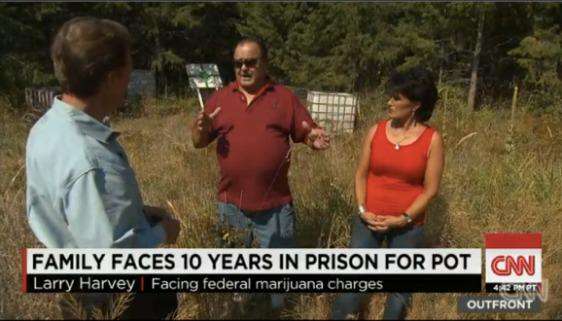Medical Marijuana Growers Escape Mandatory Minimums
Jurors reject four out of five charges against the remaining Kettle Falls Five defendants.

Yesterday a jury acquitted the three remaining defendants in the Kettle Falls Five case of all but one federal drug charge, giving them the best result that could reasonably have been expected, short of a hung jury or outright nullification. Rhonda Lee Firestack-Harvey was convicted, along with her son, Rolland Gregg, and daughter-in-law, Michelle Gregg, of growing more than 50 but fewer than 100 marijuana plants on property that she and her husband, Larry Harvey, own in rural northeastern Washington. There were 74 plants in the outdoor garden, shared by the Harveys, the Greggs, and a family friend, Jason Zucker, all of whom have doctor's recommendations to use marijuana for symptom relief. The jurors, who deliberated for about eight hours, rejected the government's attempt to count plants grown in previous years as part of the same cultivation charge, which would have raised the total above 100, the threshold for a five-year mandatory minimum sentence. They also rejected the claim, based on guns owned by the Harveys, that the defendants possessed firearms "in furtherance of" a drug trafficking crime, a charge that carries an additional five-year mandatory minimum.
Firestack-Harvey and the Greggs were not allowed to tell the jury why they were growing marijuana, since that is irrelevant under federal law. Although the total number of plants was within Washington's presumptive limit of 15 per patient, federal prosecutors argued that it was more than the defendants could possibly have consumed on their own. The government said they must have been selling the surplus, but it had almost no evidence to support that claim, which presumably is why the jury acquitted Firestack-Harvey and the Greggs of distribution and a related conspiracy charge. It also acquitted Firestack-Harvey of maintaining a place (i.e., the home she shared with her husband) for the purpose of manufacturing and distributing marijuana.
"The jury has confirmed what we knew all along," said Phil Telfeyan, Rolland Gregg's lawyer. "This was a family doing nothing more than growing medical marijuana for themselves." Jeff Niesen, Firestack-Harvey's lawyer, called the outcome a "bittersweet" victory. "It's not a complete win," he told the Spokane Spokesman-Review. "But it's the best we could have hoped for with a criminal conviction."
Sentencing on the cultivation charge is scheduled for June 10. Under federal sentencing guidelines, 74 plants would be treated like 7.4 kilograms of marijuana, which corresponds to a "base offense level" of 12. The recommended sentencing range for someone with no criminal history at that level is 10 to 16 months, but U.S. District Judge Thomas Rice can depart from that range if he thinks it's appropriate. At sentencing, unlike during the trial, Firestack-Harvey and the Greggs can seek lenience by describing the medical conditions they were treating with marijuana. "Now we get to tell our truth," Firestack-Harvey told The Stranger's Heidi Groover.
Jason Zucker, who faced a potential 15-year mandatory minimum because of a prior marijuana conviction, agreed to testify for the prosecution and in exchange got a sentence of 16 months. Prosecutors dropped Larry Harvey from the case because he has Stage IV pancreatic cancer.
"The jury's verdict in this case sends a strong rebuke to the federal government," Telfeyan said. "Stop messing around with what medical patients and these states are doing."


Show Comments (32)